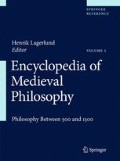Abstract
John Torquemada (1388–1468) was the leading papal apologist of the mid-fifteenth century. Torquemada, a Dominican friar trained as a Thomist, attended the Council of Basel (1431–1449) to represent his order and the king of Castile. There he became concerned that conciliarism would harm the church, the papacy, and his order. He became the pope’s defender. Eugenius IV (1431–1447) made him Master of the Sacred Palace and then a cardinal. As a member of the Roman curia he promoted orthodoxy, defended the conversos of Castile, and promoted a crusade against the Ottoman Turks. He also promoted reform of religious houses. Most notably, he wrote a massive Summa de ecclesia (1453), which defended the institutional church against the Hussite heresy and the Roman see against conciliarism. It became a source for later defenders of Rome, including Cajetan and Robert Bellarmine.
Bibliography
Primary Sources
Engelbert of Admont, Pius II, Torquemada John (2000) Three tracts on empire, trans. Izbicki TM, Nederman CJ. Thoemmes, Bristol
Torquemada John (1561) Summa de ecclesia…una cum eiusdem apparatu, nunc primum in lucem edito, super decreto Papae Eugenij IIII. in Concilio Florentino de unione Graecorum emanato. Apud Michaelem Tramezinum, Venice
Torquemada John (1869) Tractatus de veritate conceptionis Beatissimae Virginis… , ed. Pusey M. Jacobus Parker, Oxford
Torquemada John (1968) Meditationes, ed. Zirnbauer H. Harassowitz, Wiesbaden
Torquemada John (1988) A disputation on the authority of pope and council, trans. Izbicki TM. Blackfriars, Oxford
Secondary Sources
Binder K (1955) Wesen und Eigenschaften der Kirche bei Kardinal Juan de Torquemada O.P. Tyrolia, Innsbruck
Binder K (1976) Konzilsgedanken bei Kardinal Juan de Torquemada OP. Wiener Dom, Vienna
Black AJ (1970) Monarchy and community. Cambridge University Press, Cambridge
Horst U (2006) The Dominicans and the pope: papal teaching authority in the medieval and early modern Thomist tradition (trans: Mixson JD). University of Notre Dame Press, Notre Dame
Izbicki TM (1981) Protector of the faith: Cardinal Johannes de Turrecremata and the defense of the institutional church. The Catholic University of America Press, Washington, DC
Izbicki TM (1986) Papalist reaction to the council of Constance: Juan de Torquemada to the present. Church Hist 55:7–20
Izbicki TM (2005) The immaculate conception and ecclesiastical politics from the council of Basel to the council of Trent: the Dominicans and their foes. Archiv für Reformationsgeschichte 96:145–170
Kaeppeli T, Panella E (1970–1993) Scriptores ordinis praedicatorum Medii Aevi, 4 vols. Ad S. Sabinae, Rome
Oakley F (2003) The conciliarist tradition: constitutionalism in the catholic church 1300–1870. Oxford University Press, Oxford
Author information
Authors and Affiliations
Editor information
Editors and Affiliations
Rights and permissions
Copyright information
© 2011 Springer Science+Business Media B.V.
About this entry
Cite this entry
Izbicki, T.M. (2011). John Torquemada. In: Lagerlund, H. (eds) Encyclopedia of Medieval Philosophy. Springer, Dordrecht. https://doi.org/10.1007/978-1-4020-9729-4_280
Download citation
DOI: https://doi.org/10.1007/978-1-4020-9729-4_280
Publisher Name: Springer, Dordrecht
Print ISBN: 978-1-4020-9728-7
Online ISBN: 978-1-4020-9729-4
eBook Packages: Humanities, Social Sciences and Law

